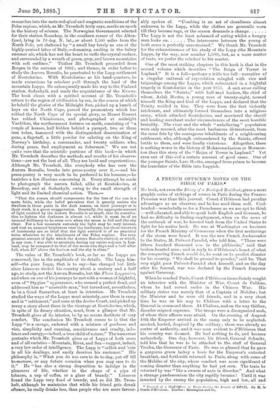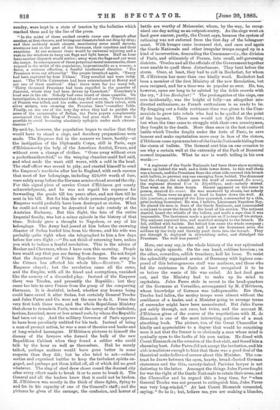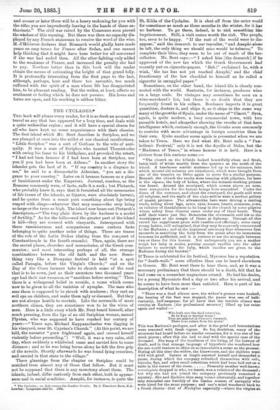A FRENCH OFFICER'S NOTES ON THE SIEGE OF PARIS.*
No book, not even.the Diary of a Besieged Resident, gives a more graphic series of etchings of scenes in Paris during the FrancoPrussian war than this journal. Count d'H6risson had peculiar advantages as an observer, and he has used them well. Coolheaded—wonderfully so for a Frenchman as we are apt to think —well-educated, and able to speak both English and German, he had no difficulty in finding employment, when on the news of the outbreak of war, he hurried back from the United States to fight for his native land. Ile was at Washington on business for the French Ministry of Commerce when the first mutterings of the storm were heard. It was the new French Ambassador to the States, M. Prevost-Parade], who told him. "There were fifteen hundred thousand non in the plaiscite," said that broken-hearted man ; and in reply to d'Herisson's boast of what the conquering French would do, he went on to predict disaster for his country. "We shall be ground to powder," said he. That very night poor Pr6vost-Paradol shot himself, and on the day after his funeral, war was declared by the French Emperor against Germany.
When he reached Paris, Count d'IT6risson immediately sought an interview with the Minister of War, Count de Palikao, whom he had served under in the Chinese War. His military status was merely that of a Captain of Mobiles ; but the Minister and he were old friends, and in a very short time he was on his way to Chalons with a letter to theGeneral in command there. At Chalons, and on the way thither, disorder reigned supreme. The troops were a disorganised mob, of whom their officers were afraid. On the evening of August 16th the Emperor arrived in the camp only to be neglected, mocked, hooted, despised by the soldiery ; there was already no centre of authority, and it was soon evident to d'H6risson that his country was doomed. He had nothing to do, and became melancholy. One day, however, his friend, General Schmitz, told him that he was to be attached to the staff of General Trochu, the Governor of Paris. He was so pleased that he gave a gorgeous green lackey a loud,' for the Emperor's untasted breakfast, and forthwith returned to Paris, along with some of the Mobiles of the city, whose conduct was more significant of coming disaster than anything he had yet seen. The train he returned by was "like a swarm of ants in disorder." And what a strange pandemonium the city rapidly became ! Until it was invested by the enemy the population, high and low, all and
sundry, were kept in a state of tension by the bulletins which reached them and by the lies of the press.
"In the midst of these excited crowds came one dispatch after another, at first obscure, and letting our disasters leak out drop by drop; and then suddenly much clearer, mentioning some small success, enormous loss on the part of the Germans, their cruelties and their exactions. At one moment there would be universal rejoicing and a rash to the windows to hang out flags and light lamps. Half an hour tater another dispatch would arrive; away went the flags and out went the lamps. In consequence of these perpetual moral somersaults, there reigned in the midst of the population, impressionable as a woman, a fever, a nervous affection, a fearful intellectual disorder. The Prussians were not advancing.' The people breathed again. 'Nancy had been captured by four Uhlans.' They recoiled and were indignant. The White Cuirassiers had been exterminated at Bonny and not one of them survived.' Alas ! there were far too many left. ` Thirty thousand Prassians had been engulfed in the quarries of Janmont, where they had been driven by Canrobert.' Everybody's head was in the air. Nobody had even heard of these quarries. On investigation, it was ascertained that they did not exist. 'Prince Albert of Prussia was killed, and his coffin, covered with black velvet, with ailver stripes, was crossing the Prussian lines '—another fable. Finally, on the eve of the very day when they had to publish the news of the catastrophe of Sedan, the Paris papers complacently announced that the King of Prussia had gone mad. How was it possible to avoid becoming absolutely epileptic under such circumstances P"
By-and-by, however, the population began to realise that they would have to standa siege, and desultory preparations were made. The Empress fled in the manner we know, hastily—at the instigation of the Diplomatic Corps, still in Paris, says d'Herisson—by the help of the American dentist, Evans, and
without even a change of clothes. "Gone away without even a pockethandkerchief," so the weeping chamber-maid had said, and what made the want still worse, with a cold in the head.
The staff officer was moved to pity, and exerted himself to send the Empress's wardrobe after her to England, with such success that most of her belongings, including 224,000 worth of furs, were safely away before the German armies closed around the city. For this signal piece of service Count d'H6risson got scanty acknowledgment, and he was not repaid his expenses for forwarding the goods till ten years after, and not then till he sent in his bill. But for him the whole personal property of the Empress would probably have been destroyed or stolen. What be could not send away he deposited for safe custody at the Austrian Embassy. But this flight, the fate of the entire Imperial family, was but a minor episode in the history of that time. Nobody gave a thought to Napoleon, or any of his belongings. The Army had jeered at him before the crowning disaster of Sedan hurled him from his throne, and his wife was probably quite right when she telegraphed to him a few days before her own flight :—" Do not think of returning here, unless you wish to induce a fearful revolution. This is the advice of Ronher and Cherraux, whom I have seen this morning. People here would say that you are fleeing from danger. Do not forget that the departure of Prince Napoleon from the army in the Crimea has affected his whole life.—Eunksrs." The Emperor obeyed ; but the revolution came all the same, and the Empire, with all its tinsel and corruptions, vanished like the scenery of a discarded play. Instead of the Emperor there was Trochu, and presently the Republic ; but they came too late to save France from the grasp of the conquering Germans. It is doubtful, indeed, whether any human being could have saved it after Sedan, but certainly General Trochu and Jules Fevre and Co. wore not the men to do it. From the very first both these men, and the whole Republican Ministry that chose to remain in Paris, were at the mercy of the turbulent, lawless, fanatical, more or less armed mob, by whom the Republic had been set up. And the military Governor of Paris appears to have been peculiarly unfitted for his task. Instead of being a man of prompt action, he was a man of theories and books and
of long-winded harangues. D'Herisson pictures to himself the dismay of the lawyers who formed the bulk of the new Republican Cabinet when they found a soldier who could talk by the hour as well as themselves. Had he merely
talked, perhaps matters would have gone better in some respects than they did ; but he also tried to act—ordered sorties and organised battles to keep the turbulent spirits engaged, and perhaps get them killed off, all of which did no good whatever. The ring of steel drew closer round the doomed city after every effort made to break it or to seem to break it. The General and all the leaders knew that it could not be broken. M. d'Herisaon was mostly in. the thick of these fights, flying to and fro in his capacity of one of the General's staff ; and the pictures he gives of the carnage, the confusion, and horror of battle are worthy of Meissonier, whom, by the way, he recognised one day acting as an outpost-sentry. As the siege went on food grew scarcer, partly, the Count says, because the system of rationing was not enforced from the first day of the beleaguer went. With hunger came increased riot, and once and again the Garde Nationale and other irregular troops surged up in a kind of insurrection, demanding the Commune—i.e., the division of Paris, and ultimately of France, into small, self-governing districts. •Trochu and all the officials of the Government together were unable to quell these disturbances. They bent before the storm. Once, at least, they had to call in Rochefort, for whom M. d'Herisson has more than one kindly word. Rochefort had been a member of the first Ministry of the new Revolution, but soon resigned, and for a time was as popular as ever. He, too, however, came ere long to be saluted by the fickle crowds with
the cry, ".3. bas Rochefort!" The prolongation of the siege, one sees incidentally, was the height of folly—an altogether misdirected enthusiasm, as French enthusiasm is so ready to be.
By dragging out a futile resistance time was given to the Com munists to grow into rebels who had to be quelled at the point of the bayonet. These men would not fight the Germans; but when the time came to struggle with their own countrymen, they fought to the death. More than once in the last confused battle which Trochn fought under the forts of Paris, to save honour and make capitulation more easy in face of the rioters, d'Herisson came upon numbers of the Garde Nationale hiding from the storm of bullets. The General sent him on one occasion to see why a certain wall at the extremity of the Park of Buzenval seemed impassable. What he saw is worth telling in his own words :—
" A regiment of the Garde Nationale had been there since morning, drawn up behind the wall, and a little lower down. In this wall there was a breach, and the Prussians from the other side covered this breach with bullets, to prevent any one emerging from behind. The drummer beat the charge, the colonel gave the word of command, En, avant, the regiment shouted Viva la Republique, and—nobody stirred. That went on for three hours. Dacrot appeared on the scene in person, shouted En avant. He was answered by shouts, but nobody moved. There were no guns at hand to batter down the wall. At this juncture, a company of the Line appeared, commanded by a thin, grim-looking lieutenant. Ho was, I believe, Lieutenant Napoleon Ney. He placed his men in front of the Garde Nationale, and commanded a serjeant to cross the breach at the head of his section. The serjeant started, heard the whistle of the bullets, and made a aign that it was impassable. The lieutenant made a gesture as if to tear off his stripes. The serjeant repulsed him, and marched straight to the breach. lie fell, riddled with bullets. But behind him came the whole company ; they hesitated for a moment, and I saw the lieutenant seize the soldiers by the body and literally push them into the breach. They got through it, deployed in skirmishing order, and dislodged the Prussians. The wall was passed."
Here, one may say, is the whole history of the war epitomised in this single episode. On the one hand, sublime heroism ; on the other, cowardice, selfish treachery, hell let loose. To resist the splendidly organised armies of Germany with legions com posed of this heterogeneous stuff was madness, and those who led the resistance in Paris at least recognised it to be so before the waste of life was ended. At last food gave out, and the Ministry had to make up its mind to capitulate. Jules Favre stole in secret to the head-quarters of the Germans at Versailles, accompanied by M. d'H6risson, whose knowledge of German was indispensable. Ere then, Trochu had fallen, the motley troops were almost without the semblance of a leader, and a Minister going to arrange terms of surrender might have been assassinated. But Jules Favre got safely through, not once, but twice, and the account M. d'Hdrisson gives of the course of the negotiations with M. de
Bismarck is one of the most interesting portions of a most absorbing book. The picture, too, of the Great Chancellor is kindly and appreciative to a degree that would be surprising
were it not that the limner is so obviously a man whose mind is cynically open to the faults of his own nation. He dined with Count Bismarck on the occasion of the first visit, and found him a charming host. Jules Favre did not accept the invitation, and his
aide is malicious enough to hint that there was a good deal of the theatrical make-believe of sorrow about this Minister. The con, tract he draws between the open, hearty, broad-chested German
statesman and the thin, carroty-haired Parisian lawyer is not flattering to the latter. Amongst the things Jules Favre fought for was the right of the Garde Nationale to retain their arms, and the Chancellor and he argued this a long time, for "when General Trochu was not present to extinguish him, Jules Fevre was very long-winded." At last Count Bismarck consented, saying, "So be it; but, believe me, you are making a blunder, and sooner or later there will bea heavy reckoning for you with the rifles you are imprudently leaving in the hands of these enthusiasts." The civil war raised by the Commune soon proved the wisdom of this warning. But there was then no capacity displayed by any French statesman to receive the word of the wise.
d'Herisson declares that Bismarck would gladly have made peace on easy terms for France after Sedan, and one cannot help thinking that it might have been better for all concerned If the war had ended then. All the after-fighting only added to the weakness of France, and increased the penalty she had to pay. Nowhere better than in this book will the reader obtain the means of estimating the height of that grand folly. It is profoundly interesting from the first page to the last, although, perhaps, here and there too sarcastic, too much suffused with the spirit of a man whose life has disappointed him, to be pleasant reading. But the writer, at least, affects no sentiment or feeling which he does not possess. His loves and hates are open, and his mocking is seldom bitter.




































 Previous page
Previous page